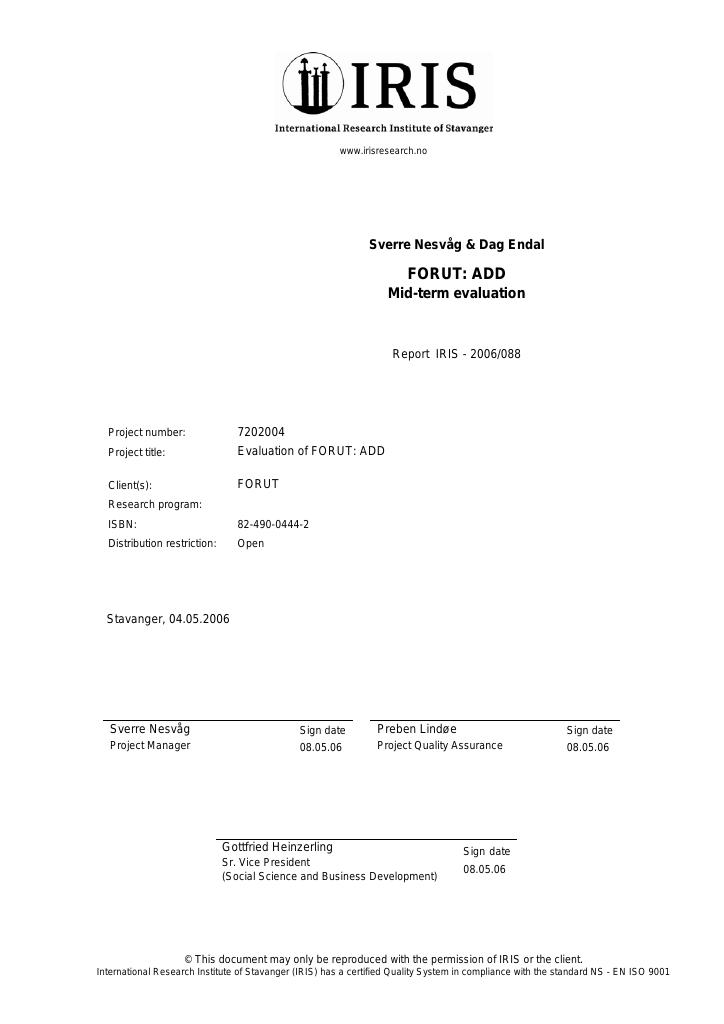Evaluering
ADD Mid-term evaluation, Report IRIS 2006/088
Background Local Partner: Alcohol and Drug Information Centre (ADIC), Sri Lanka; FORUT Sri Lanka; Child Workers in Nepal (CWIN); Association for Promoting Social Action (APSA), India; Concerned for Working Children (CWC), India; Indian Alcohol Policy Alliance; IOGT Gambia ; Association sénégalaise pour la Paix, la Lutte contre l'Alcool et la toxicomanie (ASPAT), Senegal ; FORUT Senegal; FORUT Sierra Leone. Region: South-East Asia and West Africa "Alcohol, Drugs and Development" (ADD) is a global program in FORUT, in the sense that it involves all countries with FORUT activities and also FORUT action on the international level. The Add program aims at integration of alcohol and drugs perspectives in FORUTs own development programs, as well as in the field of development cooperation in general. Purpose/objective Purpose/objective:• To generalise and present knowledge and experience obtained by the FORUT partner organizations in their implementation of ADD activities and projects.• To use this experience for further development of the ADD program in 2006-2008, and in possible future programs in the next frame agreement period.• The results of the evaluation shall furthermore contribute to the improvement and refinement of FORUT's strategies for alcohol and drug prevention in developing countries more in general. The main objective of the evaluation is consequently to be a part of the organizational learning process of the program and of FORUT. Methodology An external/internal evaluation team was established under the leadership of Sverre Nesvåg, Head of Research at the International Research Institute of Stavanger (IRIS).The evaluation team collected written documentation, verbally communicated experiences and points of view from partner organizations in the six project countries, as well as from external and internal actors.The findings are analysed and discussed in the evaluation report, together with conclusions and recommendations. Key findings The ADD program is based on a multi-level approach to alcohol and drug prevention:• Activities at local, national and global level• Community action, awareness campaigns, policy making and lobbying, research and documentation;• Specific alcohol and drug prevention projects, as well as projects where alcohol and drug prevention is integrated into more general activities of community development and promotion of health and welfare. Such a multi-level approach seems to be the only possible strategy to meet the objectives of the program. All the FORUT branches and partner organizations give full support to this approach, even if they have varied possibilities themselves for working on all the different levels.For many of the FORUT branches and partner organizations the ADD program has stimulated their work by strengthening and developing their strategies, objectives and working methods. In no way have the FORUT branches and partners felt pushed to address the ADD topics. On the contrary, it seems like the ADD program have given support to areas of work, felt to be of great importance for many of the ADD partners.As the ADD activities are implemented in all FORUT branches and partner organizations, the program has also contributed in building an organizational network within FORUT with a great potential for mutual exchange of knowledge and experience. The amount and quality of research and other forms of documentation, is an important outcome of the ADD program. On a paramount level, the evaluation report points at weaknesses in three areas: First, the lack of integration of the different FORUT branches and partner organizations in the multi-level strategy, as well as a lack of strategy on how to achieve a better integration. Secondly, the utilization of the ADD program in building an organizational learning strategy. A third weakness is the rather diffuse objectives and low capabilities of some of the partners, The report concludes by saying that "The strengths of the ADD program are the best foundation for developing the program even further, and the weaknesses and threats can easily be reformulated as opportunities for such a development." Recommendations To continue the development of FORUT as an expert organization on alcohol and drugs as an obstacle to development;To use this competence to guide other organizations and agencies on alcohol and drug prevention;To develop handbooks etc presenting best practices of both integrated and specific strategies and methods;To integrate the ADD partners into activities and networks also on the national and global level;To contribute to an increased focus on the socio-economical and cultural aspects of alcohol and drug problems, in addition to the public health perspective;To develop specific strategies for the different contexts where alcohol and drug problems occur; poverty, crisis/conflicts and modernity;To develop FORUT further as a learning organization, by collecting results and experiences from activities, analyze them, develop aggregated knowledge and use this for improvement of strategies and activities;To develop the research activities within ADD into a more comprehensive strategy for research and dissemination of results:To investigate new sources of funding for the ADD program, as the program has the potential to grow both in quality and capacity. Comments from the organisation The evaluation report forms a good basis for further development of the ADD program. On one hand the report concludes that the program is on the right track with regard to strategies and working methods, and that a lot has been achieved with relatively small resources in terms of money and staff. On the other hand the report identifies several areas where there is a potential for further development and that this development can be realized with minor adjustments. FORUT has initiated an internal process, where the evaluation report will be discussed with all partners of the ADD program with the aim to make the best possible use of the findings of the report. The process will be concluded in the autumn of 2006 with a follow-up plan to the evaluation report.
